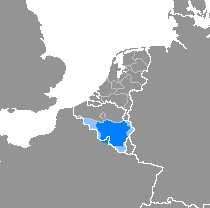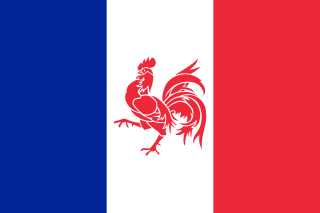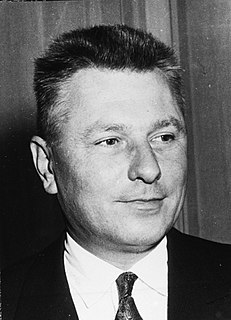
Walloons are a Romance ethnic group native to Wallonia, the southern region of Belgium and the immediate adjacent regions of France. Walloons primarily speak langues d'oïl such as Belgian French, Picard and Walloon. Walloons are historically and primarily Roman Catholic.

Wallonia is one of the three regions of Belgium—alongside the Flemish Region and the Brussels-Capital Region.

Walloon is a Romance language that is spoken in much of Wallonia and in Brussels, Belgium; some villages near Givet, northern France; a clutch of communities in northeastern Wisconsin, U.S.; and in some parts of Canada. It belongs to the langues d'oïl language family, the most prominent member of which is French. The historical background of its formation was the territorial extension since 980 of the Principality of Liège to the south and west.

The Flemish Movement is an umbrella term which encompasses various political groups in the Belgian region of Flanders and, less commonly, in French Flanders. Ideologically, it encompasses groups which have sought to promote Flemish culture and Dutch language as well as those who have sought greater political autonomy for Flanders within Belgium. It also encompasses nationalists who have sought the secession of Flanders from Belgium, either through outright independence or unification with the Netherlands.

The Parliament of Wallonia is the legislative body of Wallonia, one of the three self-governing regions of Belgium. The parliament building, the former Hospice Saint-Gilles, is situated in Namur, the capital of Wallonia, at the symbolic confluence of the Meuse and the Sambre, the two main rivers of the most inhabited parts of Wallonia, the Sillon industriel. On the other side of the Meuse, facing the Parliament, is the Élysette, the seat of the Government of Wallonia.

"The Song of the Walloons" is the regional anthem of Wallonia in Belgium. The original lyrics were written by Théophile Bovy in 1900 in the Walloon language. A year later, it was set to music composed by Louis Hillier. Performed for the first time in the city of Liège, the song quickly spread to other parts of French-speaking Belgium and established itself like a "national" anthem for Wallonia.
This article gives an overview of liberalism in Belgium. It is limited to liberal parties with substantial support, mainly proved by having had a representation in parliament. The sign ⇒ denotes another party in that scheme. For inclusion in this scheme it is not necessary that parties labeled themselves as a liberal party.

The Walloon Legion was a collaborationist military and security formation recruited among French-speaking volunteers from German-occupied Belgium, specifically from Brussels and Wallonia, during World War II. It was formed in the aftermath of the German invasion of the Soviet Union and fought on the Eastern Front as part of the German Army and later the Waffen-SS alongside similar formations from other parts of German-occupied Western Europe.
Aimée Bologne-Lemaire was a Belgian feminist, member of the resistance, and Walloon activist.
The Walloon Movement is an umbrella term for all Belgian political movements that either assert the existence of a Walloon identity and of Wallonia and/or defend French culture and language within Belgium, either within the framework of the 1830 Deal or either defending the linguistic rights of French-speakers. The movement began as a defence of the primacy of French but later gained political and socio-economic objectives. In French, the terms wallingantisme and wallingants are also used to describe, sometimes pejoratively, the movement and its activists. To a lesser extent, the Walloon Movement is also associated with the representation of the small German-speaking population in the East Belgium of the Walloon Region.
The Walloon Movement traces its ancestry to 1856 when literary and folkloric movements based around the Society of Walloon language and literature began forming. Despite the formation of the Society of Walloon Literature, it was not until around 1880 that a "Walloon and French-speaking defense movement" appeared, following the linguistic laws of the 1870s. The movement asserted the existence of Wallonia and a Walloon identity while maintaining the defense of the French language.

Rattachism or Reunionism (Réunionisme) is a minor political ideology which calls for the French-speaking part of Belgium or Wallonia to secede from Belgium and become part of France. Brussels, which is majority French-speaking but enclaved in Flanders, may be included within this ideology as may the six Flemish municipalities with language facilities for French-speakers around Brussels. It can be considered a French-speaking equivalent of Orangism or Grootneerlandisme in Flanders.
The history of Wallonia, from prehistoric times to the present day, is that of a territory which, since 1970, has approximately coincided with the territory of Wallonia, a federated component of Belgium, which also includes the smaller German-speaking Community of Belgium. Wallonia is the name colloquially given to the Walloon Region. The French word Wallonie comes from the term Wallon, itself coming from Walh. Walh is a very old Germanic word used to refer to a speaker of Celtic or Latin.

The Manifesto for Walloon Culture, was published in Liège on 15 September 1983 and signed by seventy-five "key figures in artistic, journalistic and university circles" of Wallonia.

The Walloon Region, commonly called Wallonia, is one of the three federal Regions of Belgium, and its capital is Namur. It comprises, as defined by Article 5 of the Constitution of Belgium, the provinces of Walloon Brabant, Hainaut, Liège, Luxembourg and Namur. The Walloon Region has an area of 16,844 km² with nearly 3.5 million inhabitants.

The Reichsgau Wallonia was a short-lived Reichsgau of Nazi Germany established in 1944. It encompassed present-day Wallonia in its old provincial borders, excluding Comines-Warneton but including Voeren. Eupen-Malmedy and Moresnet were also omitted, both of which had already been incorporated into Germany after its victory in the Battle of France in 1940.

André Renard was a Belgian trade union leader and political theorist who, in the aftermath of World War II, became an influential figure within the Walloon Movement.
Albert Henry was a Belgian Romance philologist and a Walloon activist.

The Walloon Front for the Unity and Freedom of Wallonia was a political party in Belgium.

The Union des Femmes de Wallonie was a Belgian women's association founded in 1912 by Léonie de Waha, assisted by Marguerite Delchef, to stimulate interest in Walloon culture and politics. Initially, it encouraged women to participate in the revival of Wallonia, especially in regard to the region's language and folklore. Following the organization's re-establishment after the First World War, more attention was given to women's emancipation. In the 1930s, the focus was on women's suffrage, higher education and professional opportunities for women, although some participants continued to stress the importance of the role of women in the home. From 1920 to 1936, the UFW published the journal La Femme wallonne which generally presented a feminist approach in support of overcoming traditional stereotypes and working towards universal suffrage.











